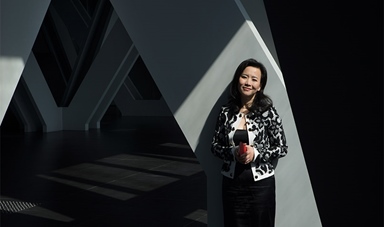Loading component...
At a glance
By Joseph Catanzaro
In many ways, Cheng Lei’s childhood in communist China was the unlikely impetus for her early career path.
It was the 1980s, staples like meat remained rationed, and life was still harsh.
“My first home [in Hunan Province] had been turned into dormitories from pigsties, literally,” Lei says.
When the family moved to Melbourne in 1985, Lei says her parents brought the immigrant obsession for financial security with them.
Which is why, in 1992, Lei began a bachelor of commerce at the University of Queensland. There was just one hitch.
“I never wanted to be an accountant,” she confesses.
“I wanted to do journalism. But Dad said, ‘Which TV station would hire a Chinese reporter? And accounting will ensure your employability.’”
As it turns out, her dad was both right and wrong.
Sitting in a bustling Beijing restaurant, in a suburb where luxury fashion outlets line roads backed up with flash European cars, Lei says she and China have come a long way.
The 39-year-old is now a business presenter for CCTV News, China’s largest broadcaster, and has interviewed more than 300 CEOs and economists, including big names Bill Gates and Sir Richard Branson, in a journalism career spanning 13 years.
Lei concedes her accountancy skills help.
“Understanding how the corporate world works is a great start,” she says.
That start came in 1995 with an accounting gig at Cadbury Schweppes, followed by a business analyst role at ExxonMobil in 2000.
But feeling restless, in 2001 she took an analyst role with Luneng Finemore Logistics in Shandong, 500km from Beijing.
Australian trucking magnate Ron Finemore had a minority stake in the venture transporting coal from mines to power stations. Lei says what he’d been promised by Chinese partners didn’t add up.
“A 30 per cent annual return for 30 years? You don’t get that,” she says.
When Toll took over Finemores, Lei correctly advised the then chairman of the company to get out of the venture.
But she couldn’t shake the journalism bug. In 2002, she went in for a screen test at CCTV-9, the precursor to CCTV News.
“They said ‘we can take you on as an intern’,” she recalls. “That was a big pay cut.” Just three months in, she was on air, presenting.
Her big break came in 2003, when she got the job as China correspondent for CNBC, flitting between Singapore and Shanghai.
In the next nine years, she made her name interviewing business leaders with her alternately probing and playful style.
She returned to CCTV in 2012, and concedes she has her “fingers on the chopsticks” when it comes to sorting fact from fiction in China’s slowing economy.
But looking ahead, she believes companies catering to China’s growing domestic market could be a good bet.
Trick of the trade
Lei says that people should leverage their practical skills to follow their dreams, however impractical they may seem.
“I think there are boring people, not boring professions,” she says with a laugh. “Do what you love; everything is possible.”

